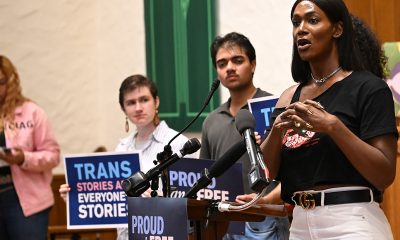National
Kameny’s ashes still not buried 2 years after death
Activist says heir to estate may be responsible for delay in signing agreement
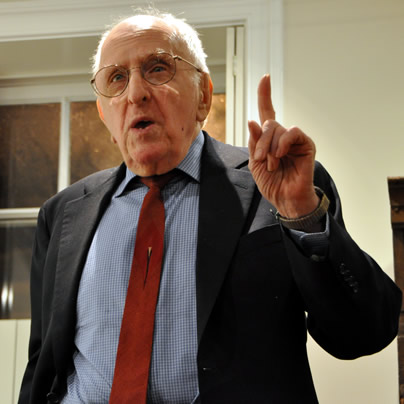
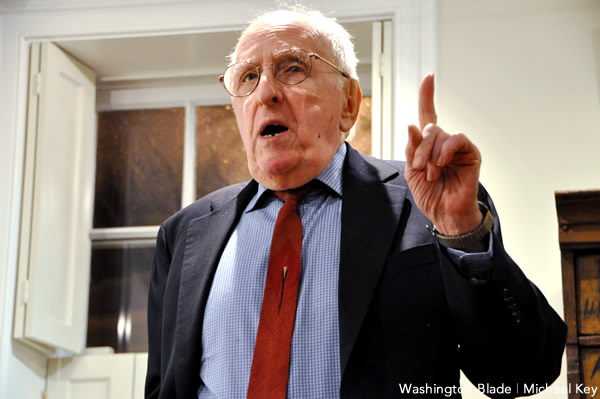
Activist Frank Kameny died on Oct. 11, 2011. His remains have not yet been buried. (Washington Blade file photo by Michael Key)
A memorial site recognizing the legacy of the late D.C. gay rights pioneer Frank Kameny was scheduled to be unveiled Friday, Oct. 11, in Chicago on the second anniversary of his death while plans for the burial of his ashes in Washington remain stalled.
New information behind that unusual turn of events emerged this week from one of the parties in a dispute over ownership of the planned interment site for Kameny’s ashes in D.C.’s historic Congressional Cemetery.
Marvin Carter, executive director of the local LGBT charitable group Helping Our Brothers and Sisters (HOBS), said his attorney told him an agreement reached about two months ago in which HOBS would transfer ownership of the cemetery plot to the Kameny estate was awaiting the signature of Timothy Clark, Kameny’s friend, housemate and principal heir to the estate.
“The last update I got was we are all in agreement but Ackerman Brown cannot find Clark to sign the paperwork,” Carter told the Blade.
Carter was referring to the D.C. law firm Ackerman Brown, which has represented Clark in legal matters pertaining to the estate since shortly after Kameny died in his home of natural causes on National Coming Out Day on Oct. 11, 2011. In his will, Kameny left his house and all other possessions except his voluminous gay rights papers to Clark. He bequeathed his papers to the Library of Congress. Kameny’s house sold last year for $725,000.
Glen Ackerman, managing partner of Ackerman Brown, emailed a statement to the Blade this week disputing Carter’s assertion that Clark can’t be found.
“Ackerman Brown is in regular contact with Timothy Clark, the personal representative of the Estate of Frank E. Kameny and all negotiations on behalf of our client have been in good faith,” the statement said. “The decision regarding interment of Frank Kameny’s ashes rests solely with Mr. Clark and he is discharging his duties with full knowledge of the past negotiations. Neither Marvin Carter nor his attorney have ever discussed the placement of a monument in lieu of the cemetery plot with Ackerman Brown.”
Ackerman noted that the status of the negotiations between Ackerman Brown and HOBS over the ownership transfer of the cemetery plot had not changed since July. At that time, Ackerman’s law partner, Christopher Brown, said a “tentative agreement” had been reached to end the dispute that has prevented Kameny’s ashes from being interred for nearly two years.
“The tentative agreement was reached on July 9 and the estate is awaiting further input from HOBS’ counsel that is necessary to finalize the transaction,” Brown said in a July 24 statement to the Blade.
“The estate has always been, and remains willing to work with gay community representatives who knew Frank Kameny in organizing a burial service and appropriate gravesite at which members of the community could pay tribute to Kameny,” Brown said in his July statement.
Earlier this year, Carter said HOBS dropped a previous condition that called for the Kameny estate to pay HOBS for the cemetery plot that HOBS purchased with money donated by members of the LGBT community.
“We are not asking for a dime from the estate,” Carter told the Blade in an Oct. 4 interview. “The delay is not on our end.”
Carter said that once the tentative agreement was reached the two parties asked Congressional Cemetery President Paul Williams to draft the documents needed to finalize the ownership transfer of the cemetery plot.
When contacted by the Blade last week, Williams said he could not provide details but suggested the long-awaited resolution to the dispute was in the hands of Clark and his attorneys.
“We have put forth a proposal to the estate and we’re waiting to hear back,” he said. “That’s about all I can say. We’re just waiting to hear back.”
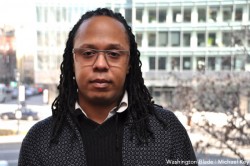
Timothy Clark (Washington Blade file photo by Michael Key)
Clark said in August, one day prior to Brown’s statement to the Blade, that he understood an agreement had been reached over the cemetery plot. He said he was thinking about when to arrange for a burial ceremony and that he would welcome suggestions from Kameny’s friends and fellow activists about the details for such a ceremony.
Clark didn’t respond to a phone message from the Blade this week.
HOBS and a group of Kameny’s friends and colleagues in the LGBT rights movement initially scheduled an interment ceremony for Kameny at Congressional Cemetery for March 3, 2012. At the time, Charles Francis, a Kameny friend who helped Kameny organize his papers to facilitate their donation to the Library of Congress, arranged for the U.S. Department of Veterans Affairs to provide a military headstone for the gravesite that recognized Kameny’s service in the Army in World War II.
With money raised by HOBS, Francis and Kameny’s friends and fellow activists Rick Rosendall and Bob Witeck also arranged for the purchase of a separate headstone for the gravesite bearing the inscription “Gay is Good.” Kameny, who coined that slogan in the 1960s to advance the cause of gay rights, said it was something for which he wanted to be remembered as much if not more than any of his other accomplishments.
But just as both stones were placed at the gravesite, Witeck announced that the burial of Kameny’s ashes had been cancelled after the estate told the cemetery it would not release Kameny’s ashes until it obtained legal ownership of the burial plot from HOBS. Cemetery officials later removed the headstone and “Gay is Good” marker and placed them in storage, saying it was inappropriate for them to remain in place while the ownership of the gravesite was in dispute.
Michael Bedwell, a longtime friend and gay activist colleague of Kameny’s who helped select the gravesite, said the removal of the two stones displaced an important and historic site where people could go to reflect on Kameny’s accomplishments, which he said improved the lives of LGBT people.
“It is a disgrace that people don’t have a place to pay homage to him two years after his passing,” Bedwell said. “I feel those stones should be returned to the site even if the ashes are not interred there at this time.”
Tension between the Kameny estate and Carter, Francis, Witeck and Rosendall increased in the months following the cancellation of the burial when the estate sued the four men on grounds that they removed without permission items from Kameny’s house shortly after his death. The four said they removed the items for safekeeping at a time of confusion following Kameny’s death when Clark, who was living in the house at the time, gave them permission to enter the house to sort through Kameny’s belongings. They said they planned to return the items, some of which were papers slated to go to the Library of Congress.
Rosendall said this week that the men were accompanied by local attorney Michele Zavos when they entered Kameny’s house shortly after his death. Zavos had worked for Kameny and prepared his will, Rosendall said.
Zavos on Wednesday confirmed that she was present during that visit. She said Clark gave them permission to enter the house and that he understood that Rosendall and the other men wanted to look through Kameny’s papers and other historic items to take steps to preserve them.
According to Zavos, it was during that visit that Rosendall, Francis and Witeck found the original signed copy of Kameny’s will and turned it over to Zavos, who read and explained its provision to Clark.
“Tim was completely aware of what we were doing,” she said.
Rosendall added that he was especially troubled when Clark told the Blade in an interview in March 2012 that someone placed an anonymous letter in the mail slot at Kameny’s house where Clark was living that used a racial slur and denounced him for being the beneficiary in Kameny’s will.
“And that’s just horrible for anybody to say,” Clark said in the 2012 interview. “It said, ‘The nigger got everything.’”
When the Blade asked to see the letter, Clark claimed it was so upsetting to him that he discarded it in the trash before realizing it may have been better to keep it and have others help him discover the person who wrote it.
Rosendall, however, said Clark’s disclosure of the letter at a time when the Kameny estate was making public statements accusing him, Carter, Witeck and Francis of improperly taking items from the house could have raised suspicions that they may have been responsible for the anonymous hate letter.
“I was not under any impression that he had made an explicit accusation,” Rosendall said this week. “The whole point was he throws that out there as red meat and there is an implication that somebody else that he was talking about was to blame for it.”
The Blade requested a response from Ackerman to Rosendall’s statements about the hate letter. The Blade further asked Ackerman if anyone besides Clark saw the letter and could corroborate its existence. Ackerman emailed the following statement: “The questions you ask regarding the letter are not relevant to this firm’s representation of the Estate of Franklin E. Kameny and any comment on this topic would be inappropriate.”
North Carolina
Anti-trans bills in NC may trigger showdown with state’s Democratic governor
State Rep. Allison Dahle spoke out against the effort in an interview with the Blade
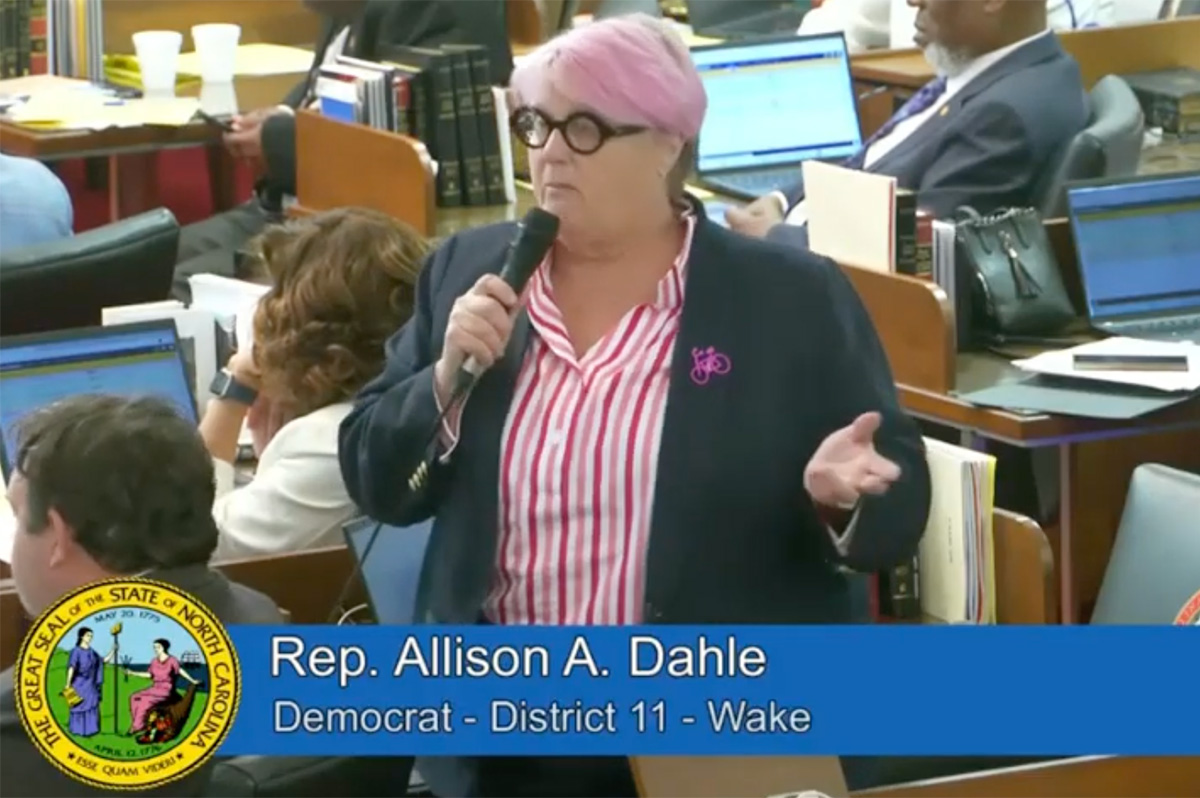
Anti-trans legislation passed this week by North Carolina’s Republican-controlled General Assembly will now head to the desk of Democratic Gov. Josh Stein, potentially setting up a showdown with just a few days before the legislature is set to break for the summer recess.
State Rep. Allison Dahle (D-Wake) told the Washington Blade during a phone interview Monday that she was “as confident as I can be” that Stein will reject the bills and also that her Democratic colleagues will line up behind him to block Republicans if they try to override the governor’s veto, which would require support from three-fifths of the House and Senate.
At the same time, there is a good chance one or two members will decide the outcome. Holding 30 of the 50 Senate seats and 71 of the 120 House seats, Republicans can clear the three-fifths threshold so long as there are no defections or abstentions and at least one House Democrat joins with the GOP caucus to override a veto.
Additionally, Dahle stressed that there are no guarantees, particularly as redistricting and shifting demographics can upend expectations for how legislators might ultimately come down on controversial votes. For example, legislation easing gun control restrictions was vetoed last week but remains in limbo because 10 House Republicans did not vote while two joined the unified Democratic caucus in opposing the bill.
With respect to the anti-trans bills passed this week, Dahle said she will “work within every inch, every millimeter of my power” to stop them from becoming law.
First was the Parents Protection Act, which per the Associated Press would “shield parents, guardians and caregivers from being cited for child abuse or neglect because they ‘raise a juvenile consistent with the juvenile’s biological sex,'” and prohibit adoption agencies from denying applicants based on their “unwillingness to allow the child to transition.”
The General Assembly passed the measure Monday with nine House Democrats joining with the GOP caucus. If those margins hold, Republicans would easily have enough support to override a veto.
On Tuesday, the North Carolina Senate passed a bill aimed at strengthening protections against the online sexual exploitation of women and children, legislation that had earned broad bipartisan support before Republican senators led by Buck Newton (Wilson) tacked on a series of anti-trans measures in committee last week, costing four votes from his caucus.
The provisions targeting transgender rights are effectively extensions of culture war legislation that was passed in 2023 during North Carolina’s last legislative session with Republicans overriding a veto from then-Democratic Gov. Roy Cooper.
Specifically, the bill passed on Tuesday would (1) extend the existing ban on most gender-affirming care for minors such that prisoners would not receive state funded gender transition hormones and therapies, (2) require officials who provide new birth certificates with updated gender markers to attach the original document with the individual’s birth sex, and (3) affirm the restrictive definitions for sex and gender that were outlined in President Donald Trump’s Jan. 20 “Defending Women” executive order.
Implications extend well beyond NC
North Carolina’s politics are often eyed as a bellwether or harbinger of trends and developments well beyond its borders because the state’s electorate is closely divided, races are often decided by razor thin margins, and control of the three branches of government is split between the two parties.
One clear take away from the anti-trans bills passed by the General Assembly this week, as noted by the AP, is how closely these efforts align with Trump’s policy agenda in his second term.
Dahle suggested that the culture war bills proposed and supported by her GOP colleagues, including those now awaiting Stein’s signature or veto, reflect the extent to which far-right wing advocacy groups are increasing their influence and exercising their leverage over conservative-led policymaking in the Tar Heel State.
Asked whether she thinks the battle over trans rights legislation in her state will have national implications, Dahle said North Carolina and Texas tend to be where Republicans launch trial balloons to see how far they can push their extreme policy proposals and their efforts to, for instance, undermine elections or redraw district maps to disadvantage Democrats.
She pointed to Allison Riggs, a Democrat who was sworn into the North Carolina Supreme Court on May 13, more than 180 days after she was elected and following a months-long battle in which her Republican opponent and his allies and supporters sought to throw out more than 68,000 votes. Riggs during the ceremony called out “efforts to undermine our rights and our democracy.”
“That was a test case,” Dahle said. “They felt like they had to try.”
With respect to efforts to undermine trans rights through legislation, Dahle said arguments against government involvement in the private lives of its people that might once have appealed to conservatives or libertarians are not picking up traction.
“None of the old school Republicans are left,” she said. Those who have left the General Assembly “know that this is wrong,” while GOP members currently serving either believe these bills serve the best interests of their constituents because “they’ve been fed a line of B.S.” or “they’re just not paying attention and they’re voting with their caucus.”
Dahle continued, “The bills are so extreme. They’re going over anything and everything having to do with transgender people. I mean, anything that has to do with care. I still, for the life of me, don’t know how this has anything to do with family values.”
She added that Republican colleagues promised during debate over a book ban proposal earlier this year that it would be the last culture war bill for a while. “it was pretty much over, or that’s at least what I was told by my colleagues on the other side, and then this one just came out of nowhere.”
U.S. Supreme Court
Legal expert maps out how gender-affirming care bans may be challenged post-Skrmetti
Ruling leaves door open to state constitution claims
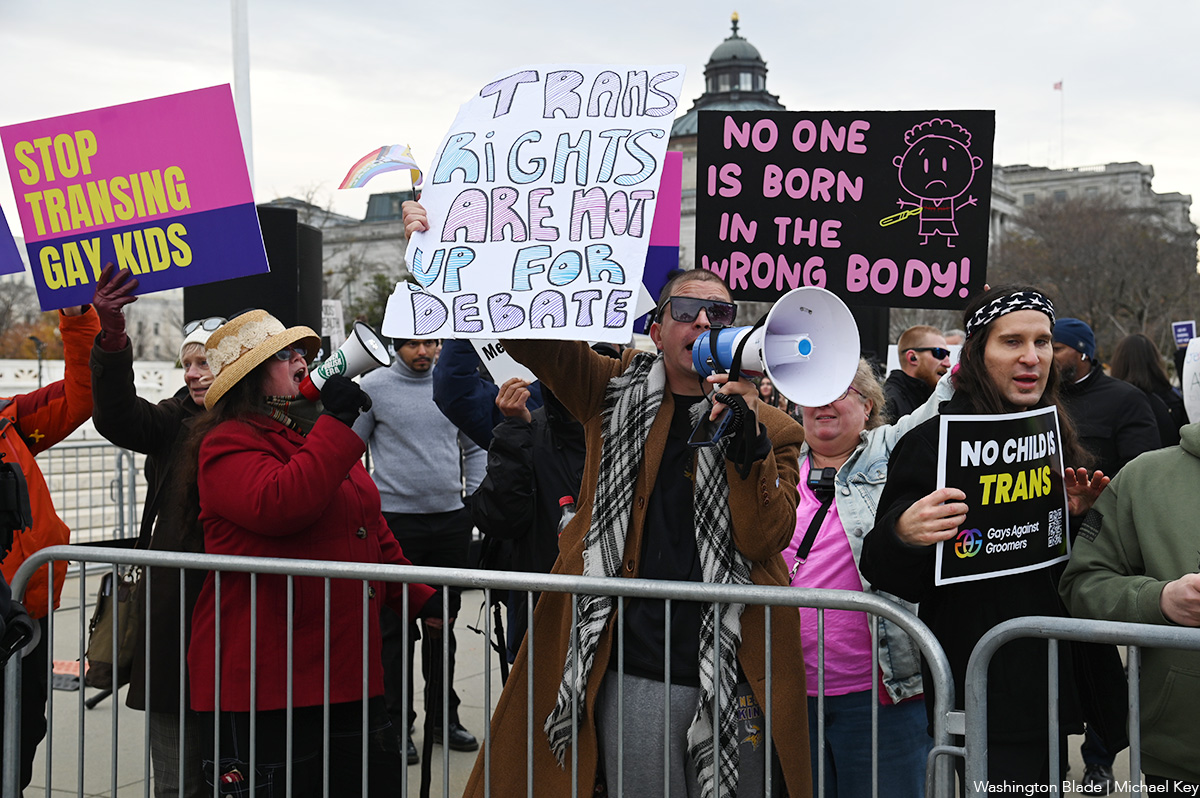
In a devastating loss for transgender youth and their families, the U.S. Supreme Court’s conservative supermajority on June 18 voted to uphold Tennessee’s law banning access to gender-affirming health care for minors in a 6-3 ruling that effectively shields similar restrictions in more than 20 other states.
Chase Strangio, a lead attorney for the plaintiffs in U.S. v. Skrmetti and the first trans lawyer to argue before the nation’s highest court, acknowledged the “setback” during a press call with reporters while stressing the need to “continue onward in the fight” because the avenues open to challenge laws like Tennessee’s Senate Bill 1 had not been fully extinguished.
Speaking with the Washington Blade on Monday, Professor Holning Lau of the University of North Carolina School of Law outlined the ramifications of the justices’ majority opinion and mapped out three ways in which cases aimed at striking down healthcare bans or other anti-trans policies and practices could play out in its wake.
An internationally recognized expert on equality rights, particularly in the contexts of sexuality, gender, and family life, Lau previously served as president of the ACLU of North Carolina’s board of directors and as a teaching fellow at UCLA’s Williams Institute on Sexual Orientation and Gender Identity Law and Public Policy.
He is also the co-author of a recent paper that examines the exceptions to laws prohibiting medical interventions for gender transitions in minors that permit “so-called gender-normalizing surgeries, which are performed on intersex infants to conform their bodies to socially constructed expectations about the male/female binary.”
These carveouts, Lau and his colleague UNC Law School Associate Professor Barbara Fedders argue, cut against the reasoning cited by the lawmakers behind legislative restrictions targeting healthcare for trans youth like SB 1 and by the lawyers defending them in court.
Specifically, Lau told the Blade courts could interpret such “intersex exceptions” as evidence that gender affirming care bans were written with or are undergirded by sex stereotypes, unwarranted fears, and disgust — possible grounds to argue they should be struck down under the animus doctrine, which holds that government action motivated by hostility or prejudice towards a particular group is unconstitutional.
While there was some discussion of animus in the context of U.S. v. Skrmetti, notably in the concurring opinion by conservative Justice Amy Coney Barrett, the plaintiffs’ case focused primarily on “the sex discrimination argument because of Bostock v. Clayton County,” Lau said, referring to the 2020 Supreme Court case that determined sex-based discrimination in the context of employment, as defined by federal civil rights law, includes discriminatory conduct that is motivated by the victim’s sexual orientation or gender identity.
‘A huge, huge setback’
Five years after LGBTQ rights advocates were toasting their victory in the landmark case, which saw three of the conservatives on the High Court joining their liberal counterparts in a majority opinion written by Justice Neil Gorsuch, “a lot of folks may have reasonably thought that the logic of Bostock points towards this very straightforward sex discrimination argument,” Lau said, adding that liberal Justice Sonia Sotomayor “adopts that avenue of reasoning in her dissent” in Skrmetti.
“The way that the majority rejects the sex discrimination arguments in in the majority opinion of Skrmetti is not persuasive in my view,” he said. “I struggle for words to capture the reasoning of the majority opinion.”
Echoing Strangio’s remarks, Lau noted that Skrmetti “doesn’t completely close the door” to legal challenges but is nevertheless “a huge, huge setback.”
On the one hand, he said “lower courts might say that this was very much about the context of medical treatment and minors,” which means “there may still be cases that prevail having to do with transgender discrimination in other contexts, like the military ban or the restrictions on passports.”
At the same time, however, Lau cautioned that “you could also read this case as signaling more obstacles ahead, especially if a case gets back to the Supreme Court” since “three of the justices have already signaled in Skrmetti that they do not view gender identity discrimination as warranting heightened scrutiny.”
Litigation aside, young people and their families who will suffer the most direct and harmful consequences, namely the loss of access to medically necessary gender-affirming care, will have to navigate “a patchwork of state laws,” he said, which in many cases will mean relocating or traveling out of state for treatments that have been criminalized in the places where they live.
The Supreme Court’s 2022 decision in Dobbs v. Jackson Women’s Health Organization, which overturned the nationwide right to abortion, led to many of these same outcomes, he said. In an email following Monday’s phone interview, Lau further explained that “Dobbs unleashed conflicts between states, and there are signs that similar conflicts will arise with respect to gender-affirming care for trans youth.”
For example, he said “A growing number of states might seek to penalize interstate travel for gender-affirming care — targeting families who travel across state lines and/or medical providers who provide care to such families.”
“There is ongoing litigation concerning the constitutionality of interstate bans and shield laws in the abortion context, and those cases will bear significance on interstate bans and shield laws regarding gender-affirming care,” Lau said.
Counsel for the plaintiffs in Skrmetti probably turned to Bostock because the case was “the most recent victory, and the most on point when it comes to gender identity,” Lau said.
The animus doctrine was an important element of cases that expanded equal rights and protections for LGBTQ people, he said, pointing to U.S. v. Windsor (2013), which struck down portions of the Defense of Marriage Act, a law that prohibited the federal government from recognizing same-sex marriages, and Romer v. Evans (1996) which struck down a Colorado constitutional amendment prohibiting the state from enacting any LGBTQ inclusive nondiscrimination rules.
Lau said those cases are examples of where the Supreme Court has found indirect evidence of impermissible animus in the laws under consideration by the way they were designed or structured, as opposed to more direct evidence like overt expressions of sex stereotypes, fear, and disgust toward a particular group that might arise during the legislative process.
These cases and the animus doctrine, Lau added, are closely associated with the late former Justice Anthony Kennedy, an appointee of President Ronald Reagan who was the “swing vote” responsible for ultimately deciding many of cases considered by the Roberts court where the justices were split 5-4.
Following his retirement in 2018 and the emergence of a 6-3 conservative majority, there is less certainty about how the justices might evaluate animus related arguments in the context of disputes over issues of gay or transgender rights, Lau said, especially relative to how they were expected to look at the reasoning central to the Bostock decision just five years ago.
“I would have liked to see more” engagement with animus in the Skrmetti opinions, Lau said. Barrett in her concurrence did address the question, writing that there was a rational basis for Tennessee legislators’ SB 1, in contrast with the court’s findings in Romer, where the “sheer breadth” of law was “so discontinuous with the reasons offered for it that the [law] seem[ed] inexplicable by anything but animus toward the class it affect[ed]”.)
“To be sure, an individual law ‘inexplicable by anything but animus’ is unconstitutional,” Barrett said. “But legislatures have many valid reasons to make policy in these areas, and so long as a statute is a rational means of pursuing a legitimate end, the Equal Protection Clause is satisfied.”
Lau said that notwithstanding her position on Skrmetti, the fact that Barrett “did make reference to the animus jurisprudence suggests that there is potentially a future for animus doctrine, even in the post-Kennedy Supreme Court.”
Rather than the animus doctrine or Bostock’s reasoning that gender identity discrimination constitutes sex based discrimination, the court relied on Geduldig v. Aiello (1974), Lau said, which found that pregnancy discrimination “is not a type of sex discrimination” and remains a case that “strikes so many people as being incorrectly decided.”
“Whenever I teach Geduldig v. Aiello, my students are shocked by the court’s reasoning,” he said, “and it’s so formalistic in its reasoning that it’s so divorced from people’s lived experiences.”
The same can be said for the majority opinion and concurrences in Skrmetti, Lau said, where the justices said “that even if transgender kids are the only ones seeking treatment for gender dysphoria, not all transgender kids are seeking this treatment, and kids can still get the treatment if they have a different type of diagnosis” such as any of the conditions delineated in the exceptions that were written into SB 1 and similar laws in other states.
“One day, I imagine teaching [Skrmetti] and my students will be, likewise, shocked at the Court’s exceedingly formalistic reasoning,” he added.
Legal challenges to anti-trans healthcare bans in a post-Skrmetti world
After Skrmetti, Lau said he expects to see cases challenging bans and restrictions on healthcare for trans youth that are based on state constitutional claims, noting “a case where there was a recent victory in Montana based on Montana’s constitution,” a win that came despite the fact that it was decided in a place that “might not strike you as particularly hospitable to transgender rights.”
“The state constitutional law claims are particularly promising,” he said, “but it’ll be very context specific,” with the cases ultimately turning on the language contained in these different constitutions and “what sort of jurisprudence we have in each particular state.”
Per Lambda Legal, “On Dec. 11, 2024, the Montana Supreme Court upheld a preliminary injunction that (Senate Bill) 99 was likely unconstitutional under the Montana state constitution’s privacy clause, which prohibits government intrusion on private medical decisions. The ruling rested entirely on state constitutional grounds, insulating transgender adolescents, their families and health care providers from any potential negative outcome at the U.S. Supreme Court.”
Lau said the remaining two primary avenues for challenging anti-trans healthcare restrictions are likely to be animus based claims and cases grounded in arguments about parental rights, a phrase that often crops up in the context of efforts to undermine rather than strengthen freedoms and protections for LGBTQ people.
The reasoning was cited in a 2023 decision by a federal judge in Idaho who temporarily struck down the state’s ban on gender affirming care for kids, writing: “Transgender children should receive equal treatment under the law … Parents should have the right to make the most fundamental decisions about how to care for their children.”
Asked whether he believes jurists will consider parental rights or animus the more persuasive argument, Lau demurred, telling the Blade “I would be hesitant to say which one is more promising,” noting that animus claims often turn on very specific evidence that might show for example that the lawmakers behind a ban or restriction on transgender medicine were driven by sex stereotypes, irrational fear, or disgust toward a particular group.
Animus and the intersex exceptions
Asked whether anti-trans legislators are being counseled to avoid overt expressions of anti-trans sentiment or prejudice for fear that they might provide grounds for a successful legal challenge against their gender affirming care bans, he said “I think that’s very possible,” adding that “legislators are savvier now in terms of concealing their motives and their biases.”
“Philosopher Martha Nussbaum was monumental and unpacking disgust as an element of animus,” Lau said. “And so in my article, I try to unpack it to help readers connect the dots that there is this visceral disgust towards both intersex children and transgender minors, and that that can be connected to the doctrine of animus.”
In their paper, Lau and Fedders focused on the potential for courts to find inferred animus in laws like Tennessee’s SB 1 based on how they are structured, with sweeping restrictions on the one hand coupled with exceptions on the other that would allow families to pursue medical interventions for their children only when they have certain conditions or diagnoses.
“If we couple that with evidence from the legislative record” pointing to animus “there may be a case to be made,” Lau said.
Both the opinions in Skrmetti and the language of the SB 1 statute address how the law allows otherwise prohibited treatments or interventions to be administered to minors when they are indicated for diagnoses other than gender dysphoria or used for purposes other than gender transitions.
“They don’t call them intersex exceptions,” Lau said, but rather “exceptions for congenital defects,” defined as “including DSDs, disorders in sexual development — or what many intersex advocates would now refer to as ‘differences’ in sexual development.”
Interact, an intersex rights organization, “filed an amicus brief in Skrmetti that dovetailed with my article in that they argued the intersex exceptions support the idea that there are sex stereotypes that undergird the gender affirming care bans,” he said.
“I would like to see more discussion of the interplay between transgender rights and intersex rights,” Lau added, noting how questions about intersex vis-a-vis trans identities are relevant beyond the context of healthcare restrictions. For instance, he pointed to the Trump-Vance administration’s directive for the State Department to not allow passport holders to have the gender markers on their documents changed to align with their gender identity, also removing the option to select ‘X’ rather than the male/female binary category.
“The restrictions on passports not only affect transgender folks, but also non-binary and intersex folks as well,” Lau said. “And with respect to the bans on gender affirming care, not only do they restrict transgender youth’s access to gender affirming care, but they reflect and reinforce this understanding of intersex conditions that is very harmful and damaging to intersex youth.”
National
Rural LGBTQ youth face greater hurdles than urban peers: study
Online support is key for many young, queer Americans

A newly released report based on a nationwide U.S. survey of 1,267 LGBTQ young people from the age of 15 to 24 shows that LGBTQ youth living in rural communities face greater hurdles in coping with their sexual orientation or gender identity.
But the report, released by the youth advocacy organizations Hopelab and Born this Way Foundation, also shows that rural LGBTQ youth have benefited significantly by accessing online resources and support services.
The 20-page report, which was released on June 24, is entitled, “Exploring Pride and Support of LGBTQ+ Young People In Rural Communities.”
Here are the key findings of the research as stated in the report:
• Rural LGBTQ+ young people report that their schools (28% vs. 49%), communities (13% vs 35%), and households (47% vs 61%) are less supportive than those of their suburban/urban peers.
• Rural LGBTQ+ young people are significantly more likely than their suburban/urban peers to give (76% vs 70%) and receive (57% vs 51%) support through online friends and communities.
• Rural LGBTQ+ young people are significantly more likely than their suburban/urban peers to meet the threshold for depression (57% vs 45%) and report less flourishing than their suburban/urban counterparts (43% vs 52%).
• Rural LGBTQ+ young people who receive support from those they live with are more likely to be categorized as flourishing (50% vs 35%) and less likely to meet the cutoff for depression (52% vs 63%)than their counterparts with little or no support.
• Despite having less support for LGBTQ+ people in their in-person environments, rural young people report high LGBTQ+ pride at all levels comparable to their suburban/urban peers (85% vs 86%).
“The survey was developed through a collaborative process that included young people in every step, from co-designing survey methods to youth-centered co-distillation support in interpreting results,” a statement released by Hopelab and Born This Way Foundation says.
The statement adds, “The insights directly center on the perspectives of LGBTQ+ young people, ages 15-24, examining how they give and receive support online, their experiences with mental health and well-being, and ways they show kindness and offer support in the face of challenges.”
The report includes a quote from a survey interview of a participant it describes as a white, nonbinary young adult: “Being neurodivergent and Queer in a small town in the South means you’re not very likely to have friends. Finding these people online was my first gateway to being treated like a normal person by my peers. It has greatly shaped who I am today in a positive way. I think I’d still be terribly depressed had I never met them.”
The report concludes by pointing out that despite facing challenges, rural LGBTQ+ young people “demonstrate levels of pride and identity connection that are comparable to their suburban and urban peers.” It adds, “This suggests that even when direct support is lacking, many rural LGBTQ+ young people are still able to find avenues to connect to others similar to them and develop a sense of identity.”
The full report can be accessed at hopelab.org.





